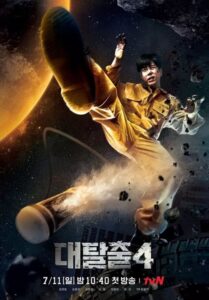
After three successful seasons of The Great Escape, naturally, viewers will have high expectations for its fourth season. Fortunately, the season did not disappoint though it was off to a rocky start. As the brainchild of producer Jung Jong-yeon (JJY PD), The Great Escape continues to outdo itself, leaving watchers in awe again and again. And that can be said after every episode is: “JJY PD is a genius”. From sets that keep getting grander to mind-blowing storylines with twists and turns, JJY PD knows no limits.
Most K-variety shows pride themselves in being “real” and given that, shows tend to rely less on having a fixed storyline. Often, storytelling and variety are two words that should not collide, yet The Great Escape does just the opposite. Thankfully, JJY PD’s attempt at challenging the mainstream has come to fruition. As the brain behind popular reality game shows like The Genius and Society Game, it is no surprise that The Great Escape is his creative playground.
While the show has been developing its storyline since season one, this season marks the establishment of the DTCU (Dae-tal-chul Universe, a romanization of “대탈출유니버스”, meaning “The Great Escape Universe”). Through DTCU, world-building works to strengthen the show’s entertainment value and successfully makes viewers’ jaws drop many times. Upon the creation of the DTCU, escapes are categorized into four main worlds: Ghosts, Zombies, SSA (Secret Security Association), and Time Machine. Ghosts and Zombies are simple to flesh out conceptually. The other two, SSA and Time Machine, are more complex. They require frequent refreshing of the viewers’ and casts’ memory as these arcs depend heavily on their narrative history, which might be the show’s weakness in the long run.
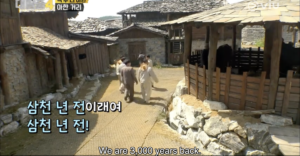
DTCU’s flaw is highlighted in its first episode, “Back To The Ahan”. As the season’s opening episode, the show cleverly continues from where season three left off in an episode called “Back To The Gyeongseong”. Both episodes are connected through their similar use of the time machine. But here’s where the disappointment kicks in. As mentioned, tapping on the time machine realm within the DTCU relies heavily on its narrative history. While JJY PD gave the cast a piece of “homework” to review the storyline from last season, none other than Shindong and Yoo Byung-jae did so. That makes only two out of the six members team aware of what’s potentially going on, rendering it difficult for the cast to remain on the same page. Shindong and Byung-jae, who also happen to be the group’s brains, had to repeatedly explain the details of the whole narrative arc. Though it is the fault of those who did not review the storyline prior to filming, this aspect of the DTCU puts a lot of pressure on the cast to know the narrative well.
At other times, JJY PD’s reliance on NPCs (non-player character) to fuel the story diminishes the show’s entertainment value. In “Back To The Ahan”, the insertion of an NPC to move the story forward, Do-ah, stole the spotlight away from the escapers. Not only that, as a viewer, it can also be difficult to keep track of the history of the narrative, especially when the time machine arc contains many dates, characters, and historical details. Though it makes for an interesting episode, there were far too many things to remember. Knowing JJY PD’s abilities, hopefully, these are just teething issues that will be fixed by the next season.
Though initially story-driven, thankfully the show picks up after the first episode by perfectly drawing a balance between its plot and puzzle-solving. In this season, “Crazy House” and “Lucky Land” illustrate this perfectly.
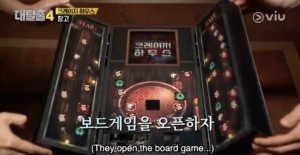
In “Crazy House”, the escapers are led into the subconscious of Oh Yeon-bum, a domestic terrorist. To further complicate the situation, while Oh Yeon-bum has been arrested, he refuses to speak about the final terror attack he planned before his arrest. As the show’s protagonists, the escapers are sent into his mind to find out about the time and place of his final bombing. Crazy House is unlike any other episode. It’s psychologically disturbing, horrifying, unpredictable, yet comedic at some points. Not to mention, the set is remarkable. At the centre of the episode is a board game where the escapers’ game pieces are being chased by a devil game piece.
Throughout the game, they are given various puzzles to solve, one that is reminiscent of the earlier days of The Great Escape. Upon failing their quests multiple times, they realise that the devil game piece is only a step behind them. At its climax, though unbeknownst to them, while their game pieces move on the board, they too are physically moving around in Oh Yeon-bum’s mind. Simply put, the board game parallels Oh Yeon-bum’s subconscious, drawing similarities to the movie Jumanji, the board game that comes to life. Given that, they are a part of the board game and are faced with the same horror when the real devil appears just a metre away from the escapers.
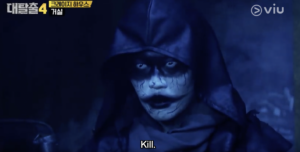
What makes “Crazy House” such a good episode is its carefully crafted story, its plot twist, and puzzles that do not interfere with the narrative but instead, force the escapers to work as a team. In turn, “Crazy House” is a complex and multi-layered story about mental disturbance that is expressed on a visual and physical level. While mental disturbance isn’t a new topic for The Great Escape (as seen in season two’s St. Matthew Jo’s Psychiatric Hospital), “Crazy House” lives up to its name and is crowned as everyone’s episode of the season. Unfortunately, “Crazy House” has no place in the DTCU. But as an incredibly well-received episode, perhaps it will find its home in the DTCU in season five.
“Lucky Land” is equally impressive as an episode with multiple twists to put forth the message: Don’t trust what you see. Lucky Land is a private casino that has a hidden secret, or more specifically, a hidden experiment that makes this episode highly deceptive.
On one hand, the escapers bragged that this was an easy escape as the missions were simple. On the other hand, they have yet to realise that they are far from escaping and that they are in for many twists. Just when they thought they were near the finishing line, the words “Game Over” plaster the screens of Lucky Land and everyone, except the escapers, freezes in place. Upon digging deeper into Lucky Land, they unveil a secret: Lucky Land hacks into the brains of those who have lost money there and by doing so, Lucky Land obtains their customers’ personal information illegally.
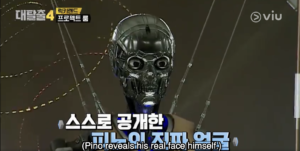
However, the escapers are entangled in yet another twist—what they’ve known so far has been fictitious. Through the clever use of a frame narrative, the real story unfolds. Everything they did prior to this discovery was a whole set-up. Lucky Land is a game or more specifically, a stimulated escape room that the escapers are invited to play. However, as they survey the casino, they discover that something gruesome had happened and they dive into solving that mystery. The escape room that the escapers have played thus far is created by a mastermind company, Fantastic Robotics. Through closer inspection, the escapers are in for a much sinister revelation: Fantastic Robotics are in the midst of creating an AI android, Pino, and unbeknownst to them, the escapers are also part of the project.
By alluding to Pinnochio (by naming the AI android Pino and its creator, Mr Geppetto), the escapers realise that Pino is out to kill them as he yearns to become a real human. As the plot thickens, Pino reveals that the escapers are androids, just like him—they, too, are androids. And at its climax, the escapers comes face to face with Pino who attempts to stop them from successfully escaping.
Rightfully, “Lucky Land” is also a crowd favourite. But more than just an entertaining episode, from a wider scheme of things, “Lucky Land” begs the big ethical question: Where should humans draw the line between artificial intelligence and human ethics? Through using an uncanny figure, Pino scares yet fascinates us as we realise that we are not far from facing AIs like him. Though set in a fictional world, The Great Escape still finds its roots in our real world. Especially with our increasing reliance on AIs and machine learning, humanising robots like Alexa can cause them to become too smart and invasive. Simply put, Pino is a peek into a very real problem in our near future. And like “Crazy House”, this episode has the potential to land itself in the DTCU under the theme of “AI androids” which would be great to see play out in the next season.
On its most foundational level, The Great Escape is a large-scale escape room. Given that, sets and props play a huge part in setting the stage visually. As JJY PD reiterates, the show only does one take to capture the escapers’ genuine reactions. Consequently, JJY PD and his team pour their hearts into creating the perfect set. The most elaborate one to date is Crazy House. The set of Crazy House can be elevated, descended, move horizontally, and its walls can even close in on the escapers in their final scene. The team’s dedication to their set design for a one-take shoot is truly impressive and makes for an appealing watch. The sets always leave viewers in awe and truly help to elevate the story. At other times, the sets are the show’s saving grace. In the season’s two weakest episodes, “Back To The Ahan” and “3rd Industrial Complex“, the storyline fell flat, but the intricate sets still wowed.

A show that achieves this level of genius can only be done under the guidance of a creative mastermind like Jung Jong-yeon. He thinks out of the box to probe viewers into thinking about humanitarian and ethical questions through the most unconventional medium: A variety show. Through the season, the show dabbles with issues that continue to keep viewers on their toes like cults (Sky Shelter), fictional history (Back To The Ahan), AI and humans (Lucky Land), and terrorism and the subconscious (Crazy House). At the same time, JJY PD manages not to neglect the entertainment aspect of the show. Though this might or might not be his motive, The Great Escape is surprisingly thought-provoking yet still entertaining thanks to JJY PD’s well thought out ideas.
Just when you think The Great Escape can’t get any better, Jung Jong-yeon PD will prove that he can always take the show to the next level. And this just makes you wonder: How grand will season five be?


